Marrakesh, expressed
Marrakesh is a raucous sprawling metropolis, both a great Arab city and a capital of Berber civilization; a mecca for historians and culture tourists as well as a non-stop circus for the curious, local and domestic. We stayed just off the Jm'a el Fna' in the Hotel Afriquia, a place Reham remembered from her trip last year as being tolerable and cheap -- and she was certainly at least half right.
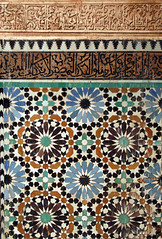
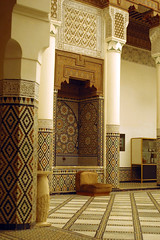
Like most, we do not live in the host country on the same parallel that we inhabit in the US. Without our stay in Ouijda, we would not have interacted with Moroccan counterparts whose daily professional and social lives resemble our own. There is some benefit to this unintended displacement, since at home we are very well sheltered from realities that poor people endure every day, and oblivious to their intelligence and effort. Language plays a role in this reshuffling of the hierarchy, since a poet laureate who spoke no Arabic or French would be functionally inarticulate and illiterate, deprived of his verbal arsenal, enduring all the practical disadvantages and social stigma attendant to that state.
Our own footing was precarious because, unlike every man, woman, and child of Marrakesh, we had neither car nor motorbike, and we do not have the skill to be pedestrians in this environment. Moroccan pedestrians step into the path of an oncoming taxi and it takes evasive action. I think that the Morocan pedestrian must never deign to take notice of the taxi's existence -- the same goes for relations among drivers. A person who pulls out obliviously is forgiven and spared. But if you look as though you have waited and calculated and timed your move out in front of a driver, this impertinence will be punished. Your hesitation and prudence will never lead cars to slow down to let you cross, but if you cross the street without looking at all, you will be perfectly safe.
Observing the traffic, as I had occasion to do for long minutes at a time, I caught myself laughing at the sight of veiled women riding motorbikes. I have laughed at versions of this same joke for years -- in the Jordanian desert, when I saw camels being transported in a pick-up truck, or when I saw men in djellebahs using computers or talking on cell phones. I realize eventually that the hilarity of these scenes reposes on the the assumed incongruity of "their" traditional lifestyle with "our" latest technology. The fact that I continue laughing is a real indictment, and I'm reminded how hard it is to unlearn habits of thinking about ourselves and other people.
We've made some cultural blunders, the most egregious one in the difficult area of mendicant relations. In general, when we have small change and the beggar is not a strapping young adolescent, we give a dirham, and when we don't, we apologize and say something polite, like "May God give you." (I might add that these are learned behaviors, and that our native upbringing might have inclined us to express outrage or cynicism.) One evening we made the mistake of asking a cafe waiter if we could stay at our sidewalk table to eat dinner. Against his better judgment perhaps, he hastened to acquiesce. While we were thus engaged in the ostentatious display of wealth, we were approached by a very, very old man who stretched out his gnarly hand. "I've got it," I said to the kids, thinking I had a one-dirham coin, but pulling out instead a ten-dirham coin (worth about 80 cents), which I could not then put back. I gave it to him, and his face lit up. He embraced me, and while he had me in his grip, began to sing. Reham took out her camera, while Ghazi hesitated between hilarity and mortification. I thanked the man, said "May God give you rest," bid him farewell and dropped other hints. After an eternity he left, extolling my generosity. I glimpsed smiling expressions on the faces of the local people drinking tea at nearby tables or passing by.
Ten minutes later, a small swarm of seven-year-old boys surrounded the table. Their poverty was not fake, but as their livelihood requires, they adopt particularly needy expressions when making the "ask" ( as our development officers would say). They pointed to our food and drink, and then began touching the bread and signaling that we should give them our soda and bottled water. We refused and told them to go away. One of them snatched Ghazi's Coke, but in the haste of his get-away, dropped it on the ground. We were angry. Ghazi shouted at them a bowdlerized version, learned from family, of the very serious insult: "Damn your religion!" (The euphemism literally means "Damn your chicken!") I adopted my mother-in-law's sternest intonation to say what I imagined she would have said: "Kelb!" ("Dog!").
Immediately , the gang of thieves became children again, frozen against the wall, fearful, confused about how to respond to this escalation. We had wounded them, using weapons we scarcely understood, and delivered blows out of proportion to our trivial loss. We instantly lost the sympathy of the onlookers. One of the adults told the children to go their way. We paid hurriedly and went off to the main square, our minds heavy.
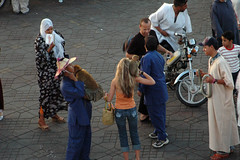
Jma' el Fna is part state fair. It has open air dining at dozens of stalls, including speciality stands for snails and for goat's head soup. You can get fresh orange juice for pennies any time, and foreign travellers will be aggresively encouraged to get henna tattoos or to pose for photos with the Assaoui dancers, the snake charmers, or the poor little macaques paraded around on chains. The more interesting area of the square is off to one side, and there you find merchants dealing in magical potions touted as cures for infertility and other ailments. Crowds gather around belly dancers -- these are men dressed in women's harem outfits -- and around animated story tellers. Indeed Jma' el Fna' has been designated some kind of world heritage site for oral traditions.
We took in this entertainment as well as the historical sights for a few days, but took a break in the middle to spend a day south of Marrakesh. Hiring a driver recommended by the Office du tourisme, we went down the Ourika valley and then up into the foothills of the Atlas mountains. We climbed up the waterfall trail at Sitti Fatima, led by a nimble and sure-footed young Berber man from the village. Strong, too, as I was thankful to discover when I lost my footing going up a very step and wet incline.
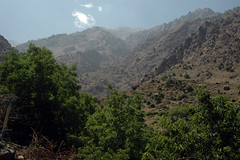
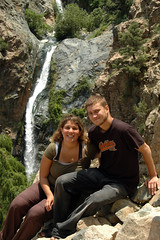
This taste of the Atlas left us eager to see more, and of that, more in the next post.


Like most, we do not live in the host country on the same parallel that we inhabit in the US. Without our stay in Ouijda, we would not have interacted with Moroccan counterparts whose daily professional and social lives resemble our own. There is some benefit to this unintended displacement, since at home we are very well sheltered from realities that poor people endure every day, and oblivious to their intelligence and effort. Language plays a role in this reshuffling of the hierarchy, since a poet laureate who spoke no Arabic or French would be functionally inarticulate and illiterate, deprived of his verbal arsenal, enduring all the practical disadvantages and social stigma attendant to that state.
Our own footing was precarious because, unlike every man, woman, and child of Marrakesh, we had neither car nor motorbike, and we do not have the skill to be pedestrians in this environment. Moroccan pedestrians step into the path of an oncoming taxi and it takes evasive action. I think that the Morocan pedestrian must never deign to take notice of the taxi's existence -- the same goes for relations among drivers. A person who pulls out obliviously is forgiven and spared. But if you look as though you have waited and calculated and timed your move out in front of a driver, this impertinence will be punished. Your hesitation and prudence will never lead cars to slow down to let you cross, but if you cross the street without looking at all, you will be perfectly safe.
Observing the traffic, as I had occasion to do for long minutes at a time, I caught myself laughing at the sight of veiled women riding motorbikes. I have laughed at versions of this same joke for years -- in the Jordanian desert, when I saw camels being transported in a pick-up truck, or when I saw men in djellebahs using computers or talking on cell phones. I realize eventually that the hilarity of these scenes reposes on the the assumed incongruity of "their" traditional lifestyle with "our" latest technology. The fact that I continue laughing is a real indictment, and I'm reminded how hard it is to unlearn habits of thinking about ourselves and other people.
We've made some cultural blunders, the most egregious one in the difficult area of mendicant relations. In general, when we have small change and the beggar is not a strapping young adolescent, we give a dirham, and when we don't, we apologize and say something polite, like "May God give you." (I might add that these are learned behaviors, and that our native upbringing might have inclined us to express outrage or cynicism.) One evening we made the mistake of asking a cafe waiter if we could stay at our sidewalk table to eat dinner. Against his better judgment perhaps, he hastened to acquiesce. While we were thus engaged in the ostentatious display of wealth, we were approached by a very, very old man who stretched out his gnarly hand. "I've got it," I said to the kids, thinking I had a one-dirham coin, but pulling out instead a ten-dirham coin (worth about 80 cents), which I could not then put back. I gave it to him, and his face lit up. He embraced me, and while he had me in his grip, began to sing. Reham took out her camera, while Ghazi hesitated between hilarity and mortification. I thanked the man, said "May God give you rest," bid him farewell and dropped other hints. After an eternity he left, extolling my generosity. I glimpsed smiling expressions on the faces of the local people drinking tea at nearby tables or passing by.
Ten minutes later, a small swarm of seven-year-old boys surrounded the table. Their poverty was not fake, but as their livelihood requires, they adopt particularly needy expressions when making the "ask" ( as our development officers would say). They pointed to our food and drink, and then began touching the bread and signaling that we should give them our soda and bottled water. We refused and told them to go away. One of them snatched Ghazi's Coke, but in the haste of his get-away, dropped it on the ground. We were angry. Ghazi shouted at them a bowdlerized version, learned from family, of the very serious insult: "Damn your religion!" (The euphemism literally means "Damn your chicken!") I adopted my mother-in-law's sternest intonation to say what I imagined she would have said: "Kelb!" ("Dog!").
Immediately , the gang of thieves became children again, frozen against the wall, fearful, confused about how to respond to this escalation. We had wounded them, using weapons we scarcely understood, and delivered blows out of proportion to our trivial loss. We instantly lost the sympathy of the onlookers. One of the adults told the children to go their way. We paid hurriedly and went off to the main square, our minds heavy.

Jma' el Fna is part state fair. It has open air dining at dozens of stalls, including speciality stands for snails and for goat's head soup. You can get fresh orange juice for pennies any time, and foreign travellers will be aggresively encouraged to get henna tattoos or to pose for photos with the Assaoui dancers, the snake charmers, or the poor little macaques paraded around on chains. The more interesting area of the square is off to one side, and there you find merchants dealing in magical potions touted as cures for infertility and other ailments. Crowds gather around belly dancers -- these are men dressed in women's harem outfits -- and around animated story tellers. Indeed Jma' el Fna' has been designated some kind of world heritage site for oral traditions.
We took in this entertainment as well as the historical sights for a few days, but took a break in the middle to spend a day south of Marrakesh. Hiring a driver recommended by the Office du tourisme, we went down the Ourika valley and then up into the foothills of the Atlas mountains. We climbed up the waterfall trail at Sitti Fatima, led by a nimble and sure-footed young Berber man from the village. Strong, too, as I was thankful to discover when I lost my footing going up a very step and wet incline.


This taste of the Atlas left us eager to see more, and of that, more in the next post.
Labels: morocco marrakesh

0 Comments:
Post a Comment
<< Home